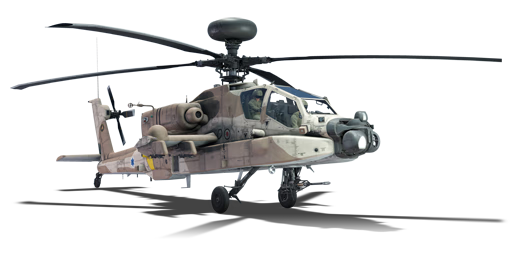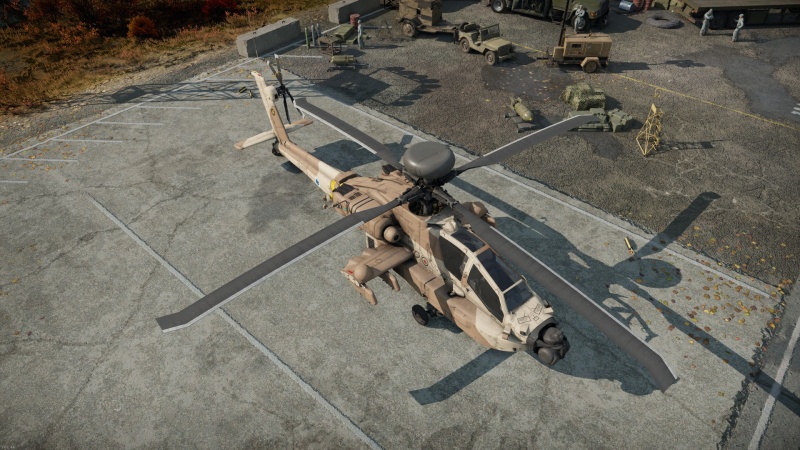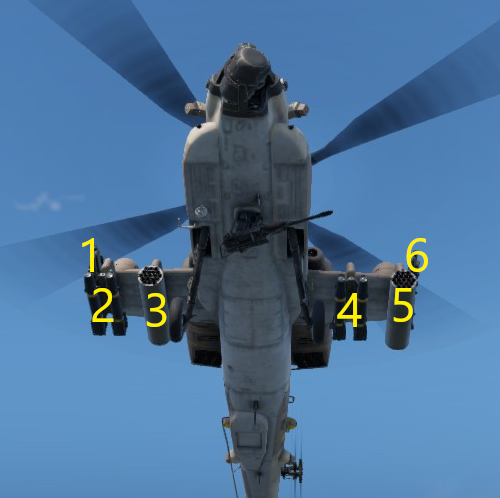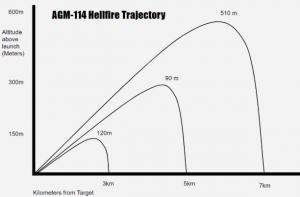Saraph
Contents
Description
The AH-64D-I Saraph is a rank Israeli attack helicopter with a battle rating of (AB), (RB), and (SB). It was introduced in Update "Danger Zone".
General info
Flight performance
The AH-64D-I Saraph, provides great manoeuvrability, incredible acceleration and overall providing a great speed of up to 319 km/h in arcade and 295 km/h in realistic and simulator game modes. It is as fast as the American AH-64D but the title of fastest Apache belongs to the British Army variant called the AH Mk.1. The IDF AH-64D-I is able to do manoeuvres other helicopters can only dream about, from barrel roles, flips to loops. Which allow it to evade enemy missiles with ease and surprise, poor enemy tankers who will be helpless to defeat it.
| Characteristics | Max Speed (km/h at 1,000 m) |
Max altitude (metres) | |
|---|---|---|---|
| AB | RB | ||
| Stock | 272 | 253 | |
| Upgraded | ___ | ___ | |
Survivability and armour
The AH-64D-I Apache "Saraph", has only limited armour protection installed with bullet proof glass only being installed on the pilot windscreen. The helicopter uses Kevlar boron carbide, composite martial which is limited only to instrument, floor and side panels around the cockpit. It does not provide the same level of protection as seen on other helicopters such as the Mi-28N.
- Bullet proof glass installed only for the pilot - 22 mm thick.
- Installation of Kevlar boron carbide, composite martial only on the: Seats, cockpit side panels, Gunner floor panels and pilot instrument panel - 20 mm thick.
Modifications and economy
Armaments
| Ballistic Computer | ||
|---|---|---|
| CCIP (Guns) | CCIP (Rockets) | CCIP (Bombs) |
Offensive armament
The Saraph is armed with:
- A choice between two presets:
- 1 x 30 mm M230E-1 cannon, chin turret (1,200 rpg)
- 1 x 30 mm M230E-1 cannon + 180 x countermeasures
Suspended armament
The Saraph can be outfitted with the following ordnance:
- Without load
- 76 x Hydra-70 M247 rockets
- 4 x AGM-114K Hellfire II missiles
- 8 x AGM-114K Hellfire II missiles
- 16 x AGM-114K Hellfire II missiles
- 4 x ATAS (AIM-92) missiles
Custom loadout options
| 1 | 2 | 3 | 4 | 5 | 6 | ||
|---|---|---|---|---|---|---|---|
| Hydra-70 M247 rockets | 19 | 19 | 19 | 19 | |||
| AGM-114K Hellfire II missiles | 2, 4 | 2, 4 | 2, 4 | 2, 4 | |||
| ATAS (AIM-92) missiles | 2 | 2 |
Usage in battles
Overview
The AH-64D-I is a Israeli modified version of the venerable AH-64D and in turn very similar to the AH-64A Apache. The differences between it and the A are the lack of an option to carry AIM-9L missiles, the new Longbow radar, improved Hellfires, and an improved ECM package. It is also slightly different to the American D version as it lacks the laser guided APKWS rockets. The Apache is an excellent helicopter for attacking ground targets, and can also hold its own against many enemy aircraft. Through adequate use of cover, teamwork, and game sense, the Apache can easily dismantle enemy teams. An Apache pilot must understand all of the tools at their disposal.
The Apache has an arsenal of weapons. The most effective anti-tank weapon in the Apache's arsenal is the AGM-114 Hellfire, which uses a top attack trajectory to destroy ground vehicles. There is functionally very little difference between the AGM-114B and K variants, used on early and late Apaches respectively.
Staying alive:
Flying the Apache effectively can be more difficult than most players would imagine, processing information from optical sights, radar displays, and the radar warning receiver all at once can lead to information overload. If distracted by irrelevant information, a pilot can quickly lose situational awareness. Being successful in the Apache requires situational awareness above all else. Due to the fragility of the helicopter, any blindspot can lead to a quick and sudden death. Additionally, the mobility of the Apache is adequate but not impressive, so evasive manoeuvres are not always effective.
Using cover is a very important part of staying alive in the Apache. Always stay behind a hill or building in ground battles. When exposing yourself in order to fire on the enemy, be mindful to not gain too much altitude. Most importantly, always listen to your RWR and MAW. If you hear an alarm, take evasive action immediately.
The biggest improvement of the later Apache variants is the ability to mount the Longbow radar system. This system, if used properly, will help maintain situational awareness.
Additionally, it is important to know when to use flares. Flares are extremely effective against heat-seeking missiles, but useless against any other missiles. It is the responsibility of the Apache pilot to recognize the threat and decide whether to use flares or not. For Apaches with MAW (missile alert warning), there is an option for flares to be dispensed automatically.
Using the Longbow radar
The radar of the Apache should be used as a secondary tool when engaging ground targets. The radar is not effective in obtaining target lock for ground vehicles. The AGM-114L radar guided Hellfire is not in the game, so guidance of Hellfires should be done by using the FLIR thermal imaging camera to lase targets. However, the radar is still useful in detecting enemy aircraft. By using the multi-function menu to switch radar mode, the radar will begin to search for air rather than ground targets. Keeping track of enemy aircraft is vital to survival in the Apache, as any plane can make quick work of the Apache if the helicopter is unprepared.
Air-to-air (Stinger and gun)
The Apache is surprisingly potent in air-to-air combat. Engagements should be conducted primarily through the use of the Stinger missile. The Stinger is a simple but effective air-to-air missile. It has an excellent seeker head and can obtain all aspect lock on almost any air target within 3-5 km (even propeller aircraft with a low heat signature). However, the Stinger can be easily fooled by flares or outmanoeuvred by a fast enemy aircraft. The best way to use the Stinger against enemy aircraft is when they are heading directly towards you. If fired at the right second, most enemies will struggle to dodge a Stinger.
If the enemy gets close, the 30 mm autocannon can be extremely effective. The gun will automatically aim with optical lock, so Apache pilots can aim accurately while taking evasive manoeuvres.
Close-range air-to-ground (gun and rockets)
At close range, the Apache has excellent offensive capability. The 30 mm autocannon is incredibly accurate even at surprisingly far distances. This cannon uses a High Explosive Dual Purpose round that can engage lightly armoured targets. Rocket pods can also be used, with the CCIP computer helping maintain accuracy even at further distances. Be careful when trying to use the Hellfire missile at close range. It can do a direct attack at closer ranges (rather than its usual top attack) but if fired at an odd angle, it may not have time to manoeuvre onto the target if fired at closer ranges.
The problem with trying to engage at close range is that doing so will put the Apache in huge amounts of danger. Enemy tanks will be able to quickly destroy the Apache with their main guns or anti-aircraft machine guns.
Long-range air-to-ground (Hellfire)
At longer ranges, the Hellfire missile can be used to full effect. The Hellfire will guide on its target as shown in the attached diagram. This is known as top attack. Being that it takes this path to the enemy target, the Hellfire can take upward of 30 seconds to reach its target at longer ranges. Do not fire at enemies that are about to move to cover, and make sure to fire multiple missiles at once in order to deal maximum damage. Because the Hellfire is laser guided, multiple missiles can be fired at once. They should be fired at intervals of 5-10 seconds, where between missiles the Apache can switch to a new ground target. This will allow for the quick destruction of multiple enemies. This tactic can be incredibly effective. Although the time to target for the most recently fired Hellfire is available on the HUD, pilots will have to keep track of all the missiles they have fired by memory and quick calculations.
Combatting enemy anti-aircraft vehicles can be a challenge. Always remain in cover and move unpredictably in combat. Use the radar warning receiver to obtain the general direction of enemy AA, and then attack with a Hellfire. An effective strategy is to fire a Hellfire, break optical lock to gain cover and avoid counterfire, and then pop back up and get lock again several seconds before the Hellfire hits. This strategy if applied correctly will result in a hit, as the Hellfire is smart enough to begin following the laser designator again once the Apache re-obtains its lock.
Pros and cons
Pros:
- Excellent ground attack armaments (Hellfire missiles and 30 mm autocannon)
- Excellent air-to-air capability with the Stinger missile and radar
- Adequate speed and manoeuvrability
- Advanced countermeasure system with radar warning receiver (RWR) and Missile Alert Warning
- Longbow radar
- High countermeasure count (x180, built in)
Cons:
- Hellfire missiles have limited self-guidance abilities from certain positions
- Hellfire missiles need line-of-sight for guidance.
- Easily destroyed by main adversary (Ka-50 & Ka-52) and enemy aircraft
History
Describe the history of the creation and combat usage of the helicopter in more detail than in the introduction. If the historical reference turns out to be too long, take it to a separate article, taking a link to the article about the vehicle and adding a block "/History" (example: https://wiki.warthunder.com/(Vehicle-name)/History) and add a link to it here using the main template. Be sure to reference text and sources by using <ref></ref>, as well as adding them at the end of the article with <references />. This section may also include the vehicle's dev blog entry (if applicable) and the in-game encyclopedia description (under === In-game description ===, also if applicable).
Media
Excellent additions to the article would be video guides, screenshots from the game, and photos.
- Videos
See also
- Related development
External links
Paste links to sources and external resources, such as:
- topic on the official game forum;
- other literature.
| Israel helicopters | |
|---|---|
| Attack | |
| MD 500 | Lahatut |
| Battle Hawk | AH-60 |
| Cobra | Tzefa D/E · Tzefa A · Tzefa B |
| Apache | Saraph · Peten · AH-64A Peten |







